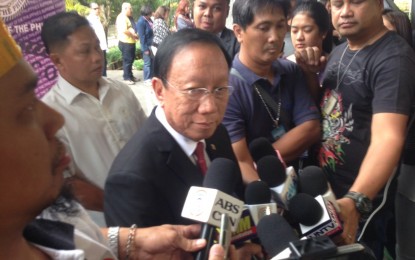
Solicitor General Jose Calida. (File photo)
MANILA -- The Office of the Solicitor General (OSG) on Tuesday asked the Supreme Court (SC) to issue a gag order on the parties in the quo warranto suit it has filed against broadcast firm ABS-CBN citing that it is violating the sub judice rule.
"(N)ot content with issuing its official statement on the petition, ABS-CBN thereafter engaged in propaganda in a clear attempt to elicit public sympathy, sway public opinion, and ultimately, to influence the resolution of the case," Solicitor General Jose Calida said in a statement.
The propaganda by the broadcast firm, Calida said, violates the sub judice rule which restricts parties, witnesses, the public in general, and most especially lawyers and judges from making comments and disclosures in relation to pending cases before the courts, acts which may render them liable for indirect contempt.
In a press briefing, SC spokesperson Brian Keith Hosaka said ABS-CBN has five days to comment on the OSG's motion.
Calida, in his motion for a gag order, cited five videos on the suit aired by ABS-CBN and its affiliate DZMM and online news platform news-abs-cbn.com.
He also cited statements given by ABS-CBN, its artists, and other personalities to various media outfits on the petition for quo warranto.
"Any grievances must be ventilated through the proper petitions, motions, or other pleadings before the courts. Our courts must be able to conduct its business in an orderly manner free from outside interference and influence," Calida said.
The Office of the Solicitor General earlier filed the petition seeking to forfeit the legislative franchise of the network and said it "highly abusive practices of ABS-CBN benefitting a greedy few at the expense of millions of its loyal subscribers."
He added that "these practices have gone unnoticed or were disregarded for years".
Calida said ABS-CBN had been hiding behind an "elaborately crafted corporate veil", and alleged that it was allowing foreign investors to take part in the ownership of a Philippine mass media entity by issuing Philippine Deposit Receipts (PDRs) through ABS-CBN Holdings Corp., which is a violation of the 1987 Constitution.
Under the 1987 Constitution, mass media ownership is limited to Filipinos.
"This simply means that mass media companies operating in the Philippines must be 100 percent Filipino-owned because they play an integral role in the nation's economic, political, and socio-political landscape," Calida said.
Calida added the broadcasting firm "abused" the privilege granted by the State when it launched and operated a pay-per-view channel in ABS-CBN TV Plus, the KBO Channel, without prior approval or permit from the National Telecommunications Commission.
"While it is true that broadcasting is a business, the welfare of the people must not be sacrificed in the pursuit of profit," Calida said.
Calida said ABS-CBN Convergence, Inc. resorted to an "ingenious corporate layering scheme" in order to transfer its franchise without the necessary congressional approval.
"The legislative franchises of ABS-CBN Corporation and its subsidiary, ABS-CBN Convergence, Inc. must be revoked. A franchise is a special privilege granted by the State, and should be restricted only to entities which faithfully adhere to our Constitution," he said.
ABS-CBN has earlier denied Calida's allegations and insisted on its compliance with all laws governing its franchise.
It also reiterated that its PDRs "were evaluated and approved" by the Securities and Exchange Commission and the Philippine Stock Exchange prior to its public offering.
At least 11 lawmakers filed proposals to take up whether the Lopez-controlled firm's congressional franchise should be granted when its original franchise expires on March 30.
Under the law, the grantees of a broadcasting franchise must secure from the government, through the NTC, the required permits and licenses for their operation. (PNA)
